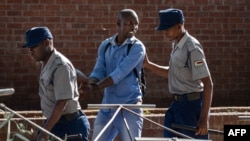The United States says there were serious human rights violations in Zimbabwe last year, which included torture and other cruel, unhuman and degrading treatment by state security forces.
In its country report on human rights practices in 2020, the United States Department of State’s Bureau of Democracy, Human Rights and Labor said security forces engaged in such practices with impunity and with implicit support of government officials.
“NGOs reported security forces abducted, assaulted, and tortured citizens in custody, including targeted assault on and torture of civil society activists, labor leaders, opposition members, and other perceived opponents of the government. Throughout the year police used excessive force in apprehending, detaining, and interrogating criminal suspects. In some cases, police arrested and charged the victims of violence rather than the perpetrators and accused abduction victims of filing false reports.
“Human rights groups reported government agents continued to perpetrate physical and psychological torture on labor leaders and opposition party members during abductions. Reported torture methods included sexual assault; beating victims with sticks, clubs, cables, gun butts, and sjamboks (a heavy whip); falanga (beating the soles of the feet); forced consumption of human excrement; and oral chemical poisoning, as well as pouring corrosive substances on exposed skin.”
According to the report, as of November there were a minimum of five reports of short-term abductions and assaults or torture allegedly performed by state security actors.
“These instances typically occurred at night, although some happened in broad daylight. The abductors forcibly removed persons from their homes, parking lots, and press conferences and assaulted them for hours before abandoning them, usually severely injured and naked, in a remote area. National Assembly member Joana Mamombe and opposition party members Cecilia Chimbiri and Netsai Marova reported being removed from police custody, then abducted and tortured by unknown individuals whom credible sources believed to be government security agents, after they were arrested at a protest at a roadblock on May 13.
“The three women sustained severe injuries from 36 hours of physical, sexual, and psychological torture. After the three women reported the crimes to police, they were rearrested and charged with making false statements to police and for faking their own abductions. The case remained pending.”
Zimbabwean officials claimed that the three made false reports to the police with some government leaders claiming they some MDC activists were being abducted by their own members. The three dismissed such allegations, claiming that they were tortured and dumped outside Harare by suspected state security agents.
The United States further claims in its 2020 human rights country report that from March to September, during a government-mandated lockdown due to COVID-19, uniformed and plainclothes soldiers and police officers systematically used clubs to beat civilians in the Harare central business district and suburbs for violating curfews, failure to wear masks, or failure to exercise social distance.
“Impunity was a significant problem in the security forces and the civilian authorities who oversee them, including police, military, and intelligence officers. To date, no one has answered for disappearances, civilian deaths, rape, abduction, or torture allegations from the 1980s to as recently as November. Security forces were firmly under the control of the ruling party and were often directed against the political opposition.
“There were reports of individuals arrested for political reasons, including opposition party officials, their supporters, NGO workers, journalists, civil society activists, and labor leaders. Authorities sometimes detained such individuals for one or two days and released them without charge. Political prisoners and detainees did not receive the same standard of treatment as other prisoners or detainees, and prison authorities arbitrarily denied visitor access to political prisoners. There were reports police beat and physically abused political and civil society activists while they were in detention.”
The report indicates that unlike normal criminal proceedings, which move from investigation to trial within months, prosecuting agents regularly took abnormally long to submit for trial cases involving members of the political opposition or civil society critics of the government.
“Hearings were sometimes scheduled when presiding judges were on vacation. Prosecutors in political cases were often ‘unprepared to proceed’ and received numerous continuances. In many cases where authorities granted bail to government opponents, they did not conclude investigations and set a trial date but instead chose to ‘proceed by way of summons.’ This left the threat of impending prosecution remaining, with the accused person eventually being called to court, only to be informed of further delays.”
The report cites the arrest and detention of journalist Hopewell Chin’ono and Jacob Ngarivhume, leader of Transform Zimbabwe Party, as examples of what the United States calls abnormal “criminal proceedings”.
“In July police arrested opposition party leader Jacob Ngarivhume and journalist Hopewell Chin’ono for their alleged roles in planning and promoting a July 31 protest against government corruption. They were held for approximately six weeks before being released on strict bail conditions that included surrendering their passports, agreeing not to use social media to promote public violence, reporting regularly to police stations. On November 3, authorities rearrested Hopewell Chin’ono for abusing social media and detained him until November 20, when he received bail.
“Both Ngarivhume and Chin’ono’s cases remained pending. In 2019 the government charged 22 persons with subversion for their participation in organizing demonstrations or attending civic engagement trainings. As of November courts had dismissed charges against 10 of the defendants. The government alleged the defendants intended to take over a constitutionally elected government. As of year’s end, the Mnangagwa administration had not fully prosecuted anyone for subversion, but those charged with subversion must surrender their passports and report to local police stations regularly.”
Information secretary Nick Mangwana was unreachable for comment as he was not responding to calls on his mobile phone. He recently dismissed as mischievous United States claims that the Mnangagwa government has failed to implement the much-needed electoral and political reforms.




